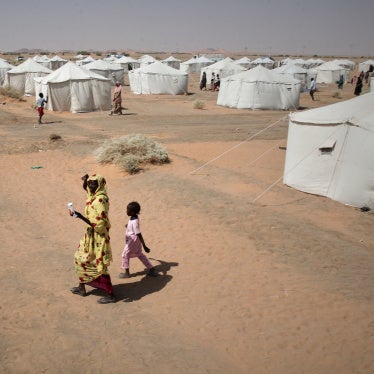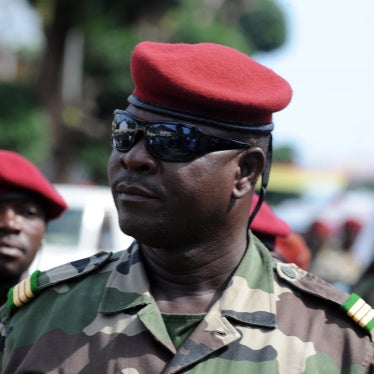April 13, 2017
Mr. Ange Rodrigue DADJE
Ms. Habiba TOURE
Dear Mr. Dadje and Ms. Touré,
We write in response to your press release, issued on April 4, 2017, regarding the March 28 acquittal of Simone Gbagbo in Côte d’Ivoire’s Cour d’Assises.
Human Rights Watch documented the terrible crimes committed by both pro-Gbagbo and pro-Ouattara forces during the 2010-11 post-election crisis, and we have consistently advocated for investigations and prosecutions for those most responsible from both sides.
The trial of Simone Gbagbo for war crimes and crimes against humanity did little to advance the cause of justice. The inadequacy of the investigation and the prosecution’s decision to try her in isolation from other leaders from the Gbagbo camp denied the court the opportunity to fully explore her role in the post-election crisis. At the same time, fundamental due process concerns, such as the failure to disclose prosecution evidence in a timely manner, denied Simone Gbagbo a fair trial. While the International Criminal Court’s (ICC) outstanding case against her may offer another avenue for victims, there has so far been insufficient progress—at the ICC and in Côte d’Ivoire —to deliver justice to victims of grave abuses committed by pro-Ouattara forces.
In the months leading up to Simone Gbagbo’s trial for crimes against humanity and war crimes, human rights groups, including Human Rights Watch, warned the Ivorian government about the risk of an unfair and incomplete hearing into her role in the crimes alleged. We expressed concern that the trial risked replicating Simone Gbagbo’s prior March 2015 conviction and 20-year sentence for crimes against the state. The International Federation for Human Rights (FIDH) stated in March 2015 that that conviction was obtained “on the basis of little credible evidence,” while Human Rights Watch said that the 2015 trial was “not conducted in accordance with international fair trial standards.”
In May 2016, on the eve of her trial for crimes against humanity and war crimes, the Ivorian government’s failure to address concerns regarding the completeness of the investigation into Simone Gbagbo, as well as the decision to try Gbagbo in isolation from other officials, led FIDH and its Ivorian partner organizations, MIDH and LIDHO, to withdraw their participation as civil parties in the trial. In explaining the decision to withdraw, FIDH expressed its belief that the trial “will not satisfy fair trial standards and will not do justice to victims.” The ultimate conduct of the trial demonstrates that these concerns were well-founded.
Simone Gbagbo’s acquittal is not necessarily a bar to prosecution at the ICC. As you know, in 2012 the ICC issued an arrest warrant for Simone Gbagbo for four counts of crimes against humanity committed during the 2010-2011 post-election crisis. The Ivorian government in 2013 challenged the admissibility of the case against her, arguing that she was being investigated domestically for similar crimes. ICC judges, however, rejected the request, stating that the investigative steps in Côte d’Ivoire into Simone Gbagbo’s responsibility were “scarce in quantity and lacking in progression.” The Ivorian government, and Simone Gbagbo herself, may now wish to again challenge her case before the ICC, arguing that she has now been tried for the same charges in Côte d’Ivoire.
However, under article 20(3) of the Rome Statute, the ICC may try an individual for the same conduct if the prior proceedings were for the purpose of “shielding the person concerned from criminal responsibility” or were “not conducted independently or impartially in accordance with the norms of due process recognized by international law and were conducted in a manner which, in the circumstances, was inconsistent with an intent to bring the person concerned to justice.” It is now for ICC judges to determine if Simone Gbagbo’s case remains admissible before the court. The incompleteness of the investigation undertaken in Côte d’Ivoire, and the resulting quality of her trial, may be relevant factors that they consider in making their decision.
Finally, we share your concern that the proceedings against Simone Gbagbo, as well as the ongoing ICC trial of her husband, underscore the Ivorian government’s failure to hold pro-Ouattara commanders accountable for their role in human rights abuses during the post-election crisis.
At the time of the post-election crisis, Human Rights Watch documented hundreds of extrajudicial killings by pro-Ouattara forces, both in the west of Côte d’Ivoire during the Republican Forces’ offensive and during the battle for Abidjan. Human Rights Watch’s October 2011 report on abuses committed by both sides listed the names of the pro-Ouattara commanders, who, based on our research, merited further criminal investigation as key players in the abuses we had documented. Since the post-election crisis, Human Rights Watch has regularly denounced the Ivorian justice system’s failure, and that of the ICC, to hold pro-Ouattara commanders accountable in court, including in major reports published in 2013 and 2016.
We understand that, as lawyers for Simone Gbagbo, your role is to advance your clients’ best interests where possible. As a human rights organization committed to the independence and impartiality of the justice process, we will continue to work with victims of Côte d’Ivoire’s devastating post-election crisis to ensure that those responsible for human rights violations from all sides are held accountable.
Yours sincerely,
Corinne Dufka
Director, West Africa
Human Rights Watch
Param-Preet Singh
Associate Director
International Justice Program
Human Rights Watch








